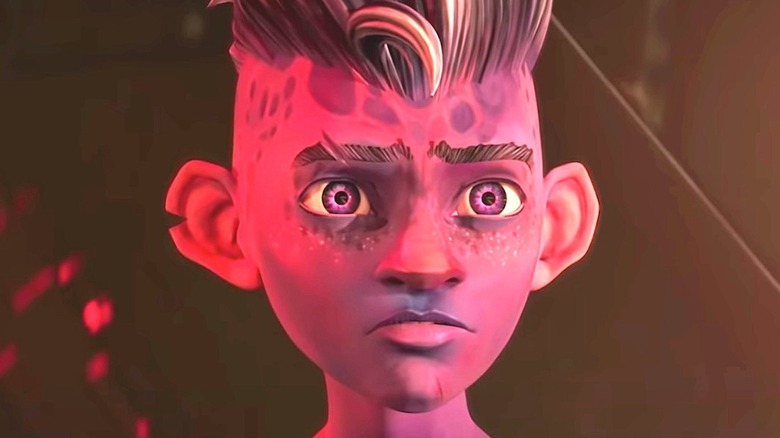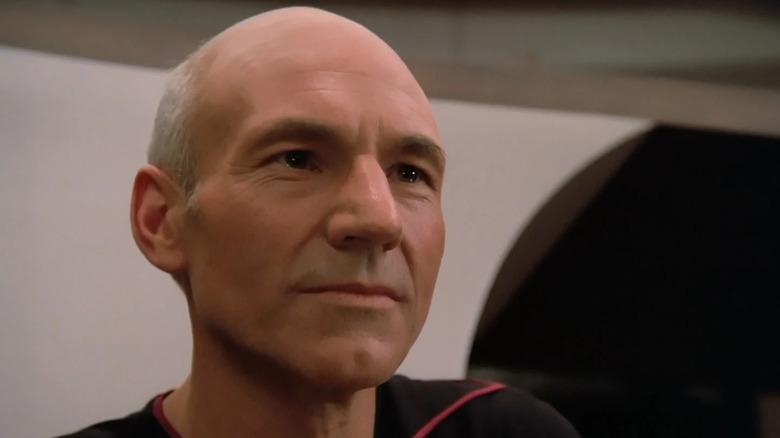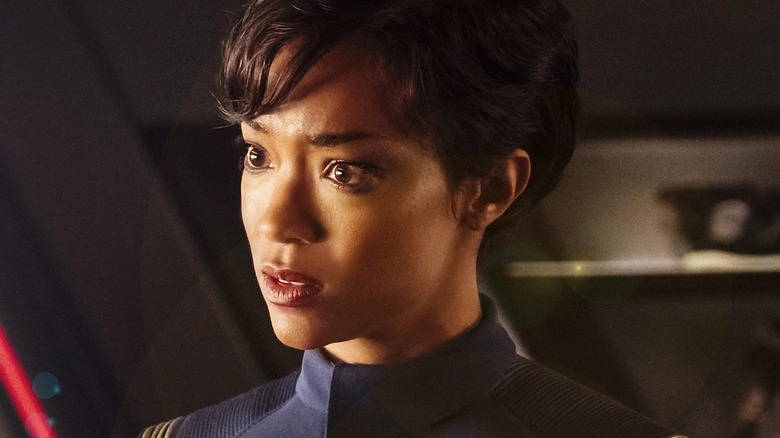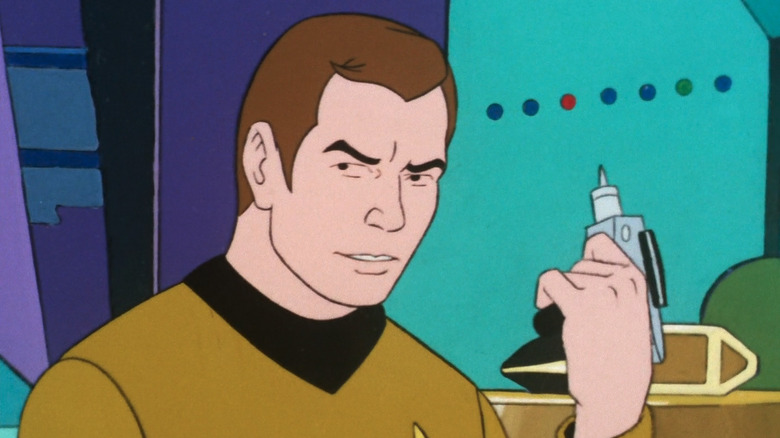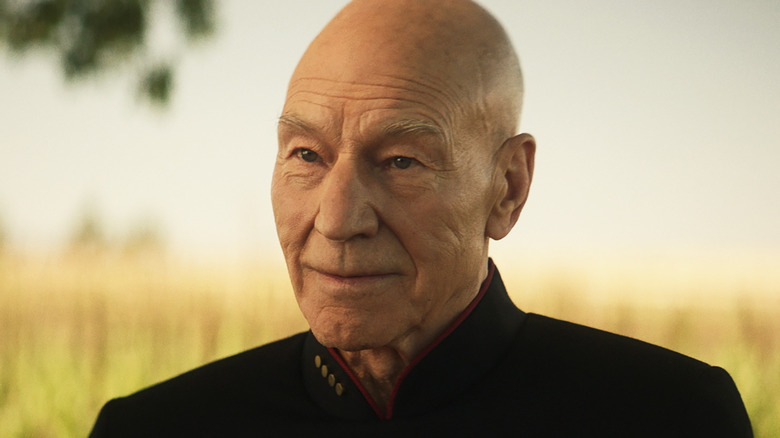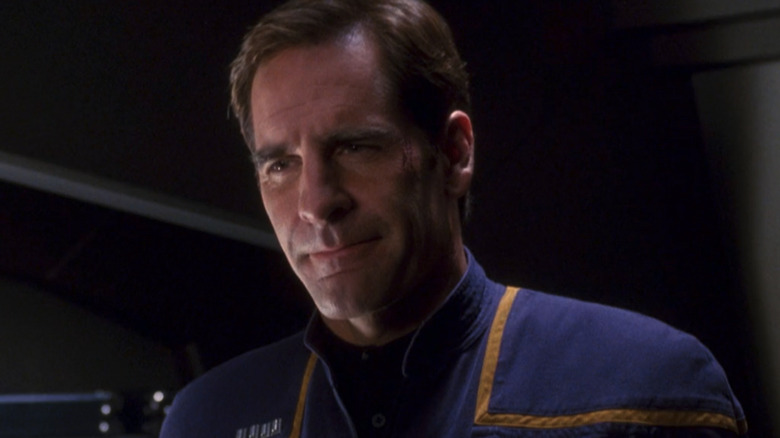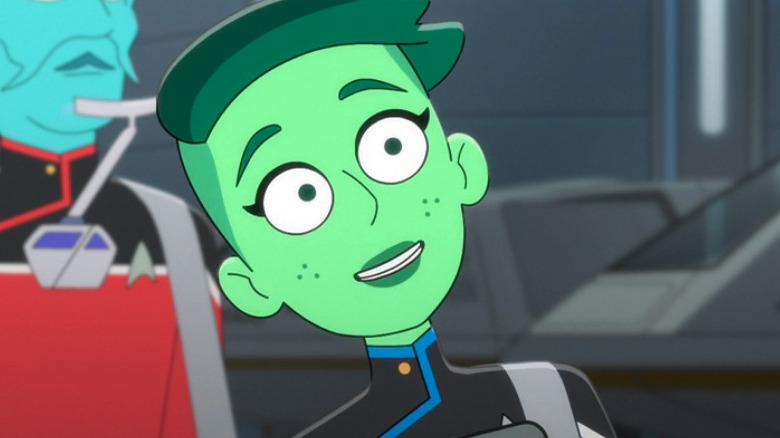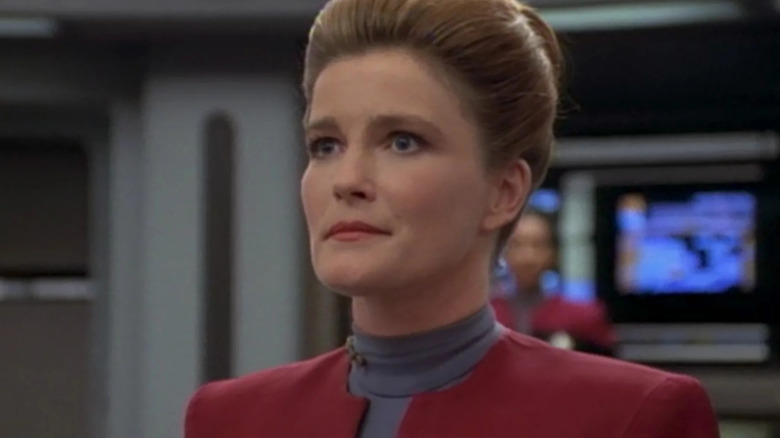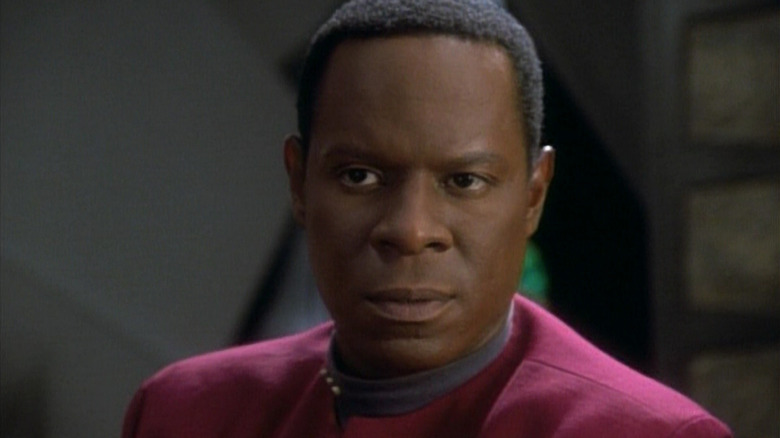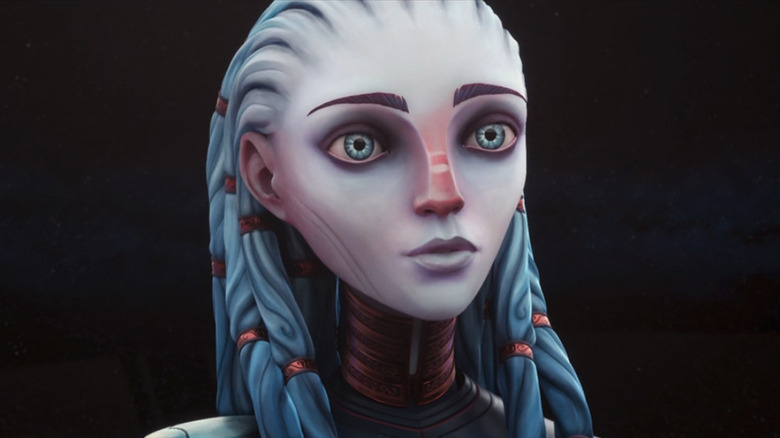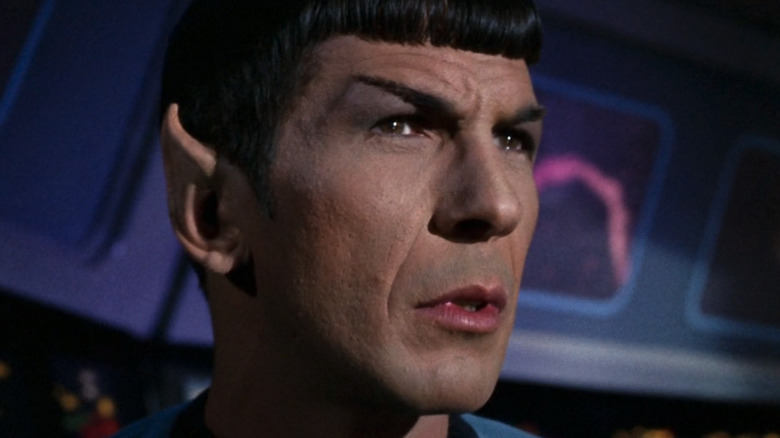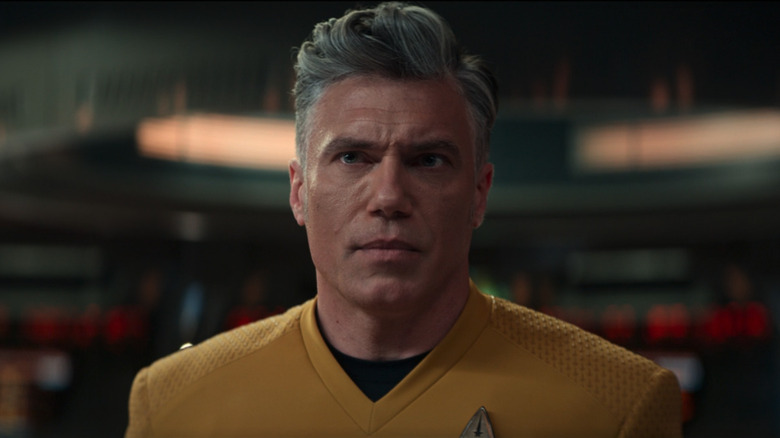Ranking Every Star Trek Series' First Season
"Star Trek" may very well be the greatest science fiction franchise of all time, a title it earns through its indelible legacy and enormous cultural impact. An entertainment behemoth, it has graced screens both big and small to tell stories packed with human drama, raw emotion, and plenty of suspense and excitement. But while there have been more than a dozen feature films in its history, "Star Trek" has always been at its best on television, with nearly a dozen full-length series to date.
From the iconic 1966 original series led by Captain Kirk all the way to modern streaming originals like "Star Trek: Discovery" and "Strange New Worlds," audiences have been dazzled by the best sci-fi that television has to offer for the best part of six decades. However, not every "Star Trek" series has gotten off to the best of starts. Some shows have struggled to get to impulse out of spacedock, while others came out at warp with phasers charged. Younger audiences might be surprised to learn that the original "Star Trek" series wasn't an overwhelming success and was actually canceled after just three seasons.
No matter how much we love every "Star Trek" series, they're not always at their best in their first years. So strap on your phaser and grab your tricorder, because we're beaming down to explore every "Star Trek" series' first season and ranking them from worst to best.
Star Trek: The Next Generation
It might come as a shock to some to see "The Next Generation," arguably the most beloved "Star Trek" series, at the bottom of this list. However, no matter how good the series became, its first season is nothing less than a train wreck. In fact, it's borderline unwatchable at times. Retro reviewers RedLetterMedia struggled to identify even a handful of decent episodes that year, and we agree; it's a season of poorly constructed, lifeless stories with uncomfortable concepts, often feeling like a show from an older era. Surprisingly cheap-looking sets and VFX that looked bad even for the day certainly don't help.
From its boring series premiere "Encounter at Farpoint" (which is notable only for the introduction of the villainous Q) to the offensive and cringe-inducing installment "Code of Honor," the series' debut season is filled with groan-worthy episodes. If one were to rewatch it today, alien races like the Ferengi and characters like Worf and Troi will seem almost unrecognizable, as writers and actors struggled to find their footing and seemed to be shaping the world as they went with absolutely no roadmap.
Thankfully, the cast and crew would crystallize midway through Season 2, the year actor Jonathan Frakes would sport new facial hair, which helped coin the phrase "Riker's Beard." The fact that it went on to become one of the greatest sci-fi shows ever helps us feel better about ranking the first season of "Star Trek: The Next Generation" as the worst debut season in the franchise.
Star Trek: Discovery
"Star Trek" returned with its first new series in over a decade in 2017, launching "Star Trek: Discovery" on CBS All Access, now known as Paramount+. Set more than ten years before the era of Kirk and Spock, it introduces an all-new ship and crew, with Commander Michael Burnham (Sonequa Martin-Green) leading a cast that includes international superstars Michelle Yeoh and Jason Isaacs.
Violent, visceral, and uncompromising, it was unlike anything Trekkies were expecting, with a darker, more adult tone than the franchise had ever seen. Though it looked as good as "Star Trek" ever had with a lavish design and massive budget, the first season got the series off to a poor start. Perhaps owed to all the behind-the-scenes drama (the series lost its creator Bryan Fuller and its first pair of showrunners were fired after the season debuted), the first season felt like a roller coaster in all the wrong ways. Controversial changes to major elements of the franchise made "Discovery" divisive among fans, too, with most audiences agreeing it was something of a misfire, whatever the cause.
In the end, the first season was muddled by a confusing story and a misguided second half that took place entirely in the Mirror Universe. But as a set-up for the further adventures of Michael Burnham and the crew of the USS Discovery, it did its job, offering up a solid jumping off point for what would eventually become the most successful "Star Trek" in more than two decades.
Star Trek: The Animated Series
While "Star Trek: The Animated Series" has come to be remembered more fondly in recent years, loved for its kitschy campiness and ridiculous weirdness, few will argue that the series is the best the franchise has to offer. Though the first season does include a smattering of intriguing stories, including a few that have helped broaden "Star Trek" lore, the silly, cost-saving measures make it a slog to sit through.
This includes nonsensical additions to the series like "life support belts," devices that allow the crew to venture to strange new worlds without the need for the animation team to draw new environmental suits. Meanwhile, long periods of still, silent imagery seem designed to kill time, which is particularly irksome in 22 minute episodes. Inexplicably stiff and stilted voice work from its star cast — much of the cast of the original live action series returned to their roles — plus constantly recycled animation turned interesting ideas into painfully awkward episodes.
Perhaps the biggest sin the series commits is having lofty goals: Freed from the restraints of live action, writers dreamed up stories and ideas so bizarre and outlandish that they broke any sense of believability. Though the season has its charms and boasts a cult following, the entertainment value mostly comes from its oddness.
Star Trek: Picard
In 2020, Patrick Stewart returned to the role that made him a household name, stepping back into the final frontier for the legacy sequel "Star Trek: Picard." Set 25 years after the events of the fourth and final "The Next Generation" film, we find a disillusioned Jean-Luc Picard has long since retired. But when he encounters the apparent daughter of his old friend Commander Data, Picard is thrust into a dangerous new dilemma with galactic consequences and must assemble a rag-tag crew for an all-new mission.
Season 1 of "Picard" offered up a compelling mystery and a high stakes adventure, but the grim tone seemed too stark a contrast to "The Next Generation." It may also have boasted one too many subplots, with a messy side story involving Borg drones, evil Romulans, and a plot to topple Federation making the season choppy and poorly paced. Worse still, what should have been an emotional conclusion was let down by a finale that felt rushed and anti-climactic. Failing to tie up the dangling plot threads in a satisfying way, the head-scratching final twist only made things worse.
Throw in a few ill-conceived character deaths, seemingly designed only to provide shock value, and it's understandable that many fans weren't happy with the show's inaugural season. But, whatever your thoughts on "Picard" may be, it's hard to deny that it boasts a charismatic cast, strong performances, and some fine moments.
Star Trek: Enterprise
The 1990s were a new golden age for "Star Trek," with three new spin-offs on the air. When "Star Trek: Voyager" closed its doors in 2000, the announcement of "Enterprise" came as something of a surprise. Perhaps worried about franchise fatigue, the studio shook things up with a prequel set 300 years earlier, chronicling the dawn of Earth's space exploration aboard the first starship to bear the name Enterprise.
Launching in 2001, the series was led by "Quantum Leap" star Scott Bakula as frontier captain Jonathan Archer, who took his newly christened starship to the furthest reaches of explored space with primitive technology and an inexperienced crew. Departing from convention, the series dropped "Star Trek" from its title initially and used an upbeat pop song for its opening credits, perhaps hoping to attract a wider audience. The first series in the franchise to be broadcast in widescreen and high definition, it had a decidedly more contemporary feel to it.
Rekindling a sense of awe and wonder, early stories saw Archer and the Enterprise on the back foot while exploring strange new worlds, coming up against new rivals like the Klingons and Andorians. While the show struggled to find its identity early on, it still delivered plenty of high drama, big adventure, and thoughtful science fiction. Though many will point to its final two years as the best of "Enterprise," the first season is not to be overlooked, as it includes some of the show's most underrated episodes.
Star Trek: Lower Decks
Looking to diversify its biggest franchise, Paramount did something different for its next new "Star Trek" series after the success of "Star Trek: Discovery" and "Picard." Debuting in August of 2020, "Star Trek: Lower Decks" returned the franchise to the world of animation, not seen since "Star Trek: The Animated Series." But this time, they went for something more humorous and decidedly more skewed toward adults. To bring it to life, they tapped "Rick and Morty" writer Mike McMahan, a self-professed Trekkie who ran a tongue-in-cheek "Star Trek" themed Twitter account that was eventually turned into a book.
"Lower Decks" also took the unusual approach of focusing on a more ordinary ship and less extraordinary crew. Set aboard the USS Cerritos just a few years after the conclusion of "Star Trek: The Next Generation," the series — which takes its name from a Season 7 episode of "TNG" — shows a different side to life aboard a Starfleet ship. Here it's the ensigns who take center stage, with their wild, wacky, often juvenile misadventures being the focus of the action.
Fast-paced, off-the-wall comedy and razor-sharp wit are complemented by an abundance of "Star Trek" Easter eggs, callbacks, and references to keep fans amused. Sure, the first season of "Lower Decks" had its flaws, with a number of gags failing to land as intended. Nevertheless, it established the series as a breezy, tongue-in-cheek look at the "Star Trek" universe, providing a strong foundation for the series to build on.
Star Trek: Voyager
A high-concept series, the pilot episode of "Star Trek: Voyager" catapulted the ship and its crew — a mix of heroic Starfleet officers and renegade Maquis soldiers — into a remote region of the galaxy. Throughout the coming seasons, they would attempt to find their way back home. For the first time in the history of the franchise, there was a woman in the captain's chair, with Kate Mulgrew taking on the now iconic role of Captain Kathryn Janeway.
The first season proved that this was going to be a more action-heavy affair compared to other "Star Trek" shows up to that point, which became one of its signature elements. While some of the series' best moments were admittedly later in the run, its first season was solidly entertaining right out of the gate. Season 1 consistently delivered well-polished episodes packed with excitement, suspense, and drama, even if it did fail to take full advantage of the compelling nature of its lost-in-space premise.
"Voyager" got off to a famously rocky start as Mulgrew was cast late in the day: The producers' original choice (Genevieve Bujold) quit not long after filming began due to the long hours, as reported by Entertainment Weekly at the time. But the series recovered, and the debut season provided several entries that remain some of the show's best, such as mind-bending mysteries like "Eye of the Needle" and terrifying tales like "Phage." Though the year wasn't perfect, the first season of "Voyager" ultimately got the series off on the right foot.
Star Trek: Deep Space Nine
Landing in January of 1993, "Star Trek: Deep Space Nine" is arguably the franchise's first true spin-off. Not only did it involve members of "The Next Generation," but its premise was spun directly out of events in that series. The show swaps out the traditional starship setting, with Commander Ben Sisko assigned to a former Cardassian outpost bordering the planet Bajor where a wormhole to the distant Gamma Quadrant has just been discovered. Political tensions between Bajor and the Cardassians form the backdrop to the season, but the revelation that Sisko is a revered religious icon to the Bajorans adds a whole new layer to the lore.
With a darker tone and an unconventional cast of characters, "DS9" stood out. At the time, its use of morally ambiguous heroes and villains and its religious angle made it a departure from the "Star Trek" formula, which may have alienated some viewers who were hoping for another "TNG." But, through its exploration of serious issues, Season 1 proved the series was "Star Trek" in every way — and perhaps even better than it had ever been.
While the first batch of episodes aren't all perfect, outside of a few notable clunkers the first season of "Deep Space Nine" remains among the best debut years for any "Star Trek" since the original. From the tone-setting premiere "The Emissary" — which established the series as something different — to the groundbreaking and topical finale "In the Hands of the Prophets," Season 1 of "Deep Space Nine" shines bright.
Star Trek: Prodigy
While "Lower Decks" returned the franchise to animation, it would be the Nickelodeon-produced, CGI-animated "Star Trek: Prodigy" that brought it back to a young audience for the first time since the 1970s. Launched in 2021, the series follows a group of pre-teens who escape an alien world after discovering an abandoned Federation starship called the USS Protostar. It also features the return of Kate Mulgrew, who voices a holographic assistant based on Captain Janeway aboard the Protostar.
"Prodigy" is far more than the light-hearted, family-friendly romp that many anticipated. It also features an ongoing mystery centering on a time travel plot involving a villain called The Diviner, who has a grudge against the Federation and wants the Protostar for his own ends. The real Admiral Janeway, meanwhile, competes with both the Romulans and the Diviner to hunt down the Protostar, which she believes may be responsible for the disappearance of her former first officer Chakotay.
Full of break-neck action and plenty of humor and heart, while also brimming with everything that makes "Star Trek" great, the debut season of "Prodigy" proved a breath of fresh air that few saw coming. With deeper connections to the wider "Star Trek" universe than Trekkies expected, the first season of "Prodigy" is definitely something different, but it still provides surprisingly hard-hitting sci-fi drama. Plus, with a number of twists and turns and stunning revelations, the series has been lauded for being accessible and entertaining for kids while still appealing to adult fans.
Star Trek: The Original Series
Later "Star Trek" series usually had at least a little bit of unevenness in their first seasons, but that definitely wasn't the case for the franchise's inaugural year. In fact, the first ever season of "Star Trek" in 1966 still stands as one of the best years in the run of any "Star Trek," debuting with some of the best episodes the show has ever produced. Solid from the start, its cast made a quick impression with its premiere "The Man Trap," which saw William Shatner, Leonard Nimoy, and the rest all slipping into their roles with ease, as if they had been living in the 23rd century all their lives.
Full of all-time greats, there was hardly a dud in the bunch in the opening year, with tense thrillers like "Balance of Terror" and "Errand of Mercy," as well as the iconic two-parter "The Menagerie" that reused footage from the show's original, unaired pilot. "Space Seed" saw the first appearance of the franchise's greatest villain, with Ricardo Montalban playing the sinister superman Khan. To cap it all off, the season's penultimate installment remains one of the best episodes ever produced; the time travel classic "The City on the Edge of Forever."
A nearly perfect launch, we could go on and on listing episodes that wowed audiences and became etched into sci-fi history. It took a while to win over critics, as early reviews were less than enthusiastic, but they eventually came around, and Season 1 of "Star Trek: The Original Series" has since become the gold standard for TV science fiction.
Star Trek: Strange New Worlds
The original, unaired pilot of the 1966 "Star Trek" series featured Captain Pike, Mr. Spock, and Number One aboard the starship Enterprise, before the studio retooled the concept to feature Captain Kirk. More than 50 years later, the story of Pike's days on the Enterprise would finally make it to the screen in "Star Trek: Strange New Worlds," starring Anson Mount as Captain Pike, Ethan Peck as Mr. Spock, and Rebecca Romijn as Number One. Other iconic "Star Trek" favorites also joined the cast, including Cadet Uhura, Nurse Chapel, and Dr. M'Benga.
With an updated look and feel, the debut season of "Strange New Worlds" is a joy to watch. Kicking off with a time-tested story about the Prime Directive, the season strides from start to finish with a confident swagger and commanding presence not unlike its bold, enterprising captain. Eschewing the more grim tone and ongoing serialized stories of sister series "Star Trek: Discovery," it returns to episodic adventures and a brighter, more upbeat spirit.
Steeped in "Star Trek" lore, "Strange New Worlds" answered long-standing questions about the franchise's history while charting its own course with a raucous self-assuredness. Wowing both critics and audiences, there wasn't a weak episode to be found in its first season, with standouts that followed common "Star Trek" tropes but with fresh and inventive flair. Action, excitement, and ample human drama made the season a wall-to-wall winner, standing triumphant as the best debut season in the history of the franchise.
